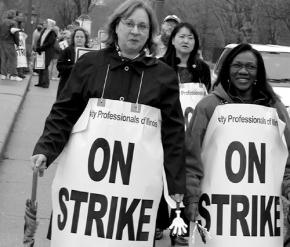A campus where free speech isn’t welcome
reports on the attempts of the administration at Northeastern Illinois University to silence a left-wing faculty member and students.
THE ADMINISTRATION at Northeastern Illinois University (NEIU) is attempting to silence the right to free speech on campus--and targeting a left-wing professor in its drive to stifle dissent.
Over the past year, administrators have set their sights on Loretta Capeheart, a professor of Justice Studies. In 2007, Capeheart was elected chair of the Justice Studies Department by a two-thirds majority of her colleagues. However, the administration refused to allow the appointment, put the department in receivership and installed an administrative representative as chair instead.
The motivations are political. Professor Capeheart is a well-known activist and scholar on campus. She was one of the leaders in her union during a 2004 strike by University and Professionals of Illinois-AFT/OFT members. That same year, Capeheart testified in the state legislature on the need to recruit greater numbers of Latino/a faculty, contradicting and infuriating Provost Lawrence Frank, who was in attendance.
In 2007, she publicly defended antiwar students who were arrested during a protest of CIA recruitment on campus.

In response to this protest, University President Sharon Hahs proposed unconstitutional restrictions on freedom of speech and assembly on campus that would have instituted "free speech zones"; required a written request at least a week in advance for any person or group planning to hold a demonstration, hand out flyers, display posters, or gather signatures on a petition; and prohibited any protest after 4:30 p.m., despite the fact that a large percentage of NEIU's student body are commuters who attend evening classes.
Due to pressure by students and faculty, Hahs was recently forced to rescind her proposals.
In 2007, in the week following the CIA recruitment event, Capeheart spoke out about the treatment of students by the administration and condemned CIA recruitment on campus at a regularly scheduled meeting of the faculty senate. Present at the meeting was NEIU's Vice President Melvin Terrell, who lashed out at Capeheart, saying that she was a "person of interest for the police," and that a student had filed stalking charges against her.
Not only were these statements completely unfounded, but they were a clear threat--that if Capeheart continued to speak out, she and her career were at stake.
"Stalking is a criminal offense," she in an interview. "I lived in continual fear that someone would come to arrest me in my class, and that I would lose my job. The message was that if I continued to speak they would come after me." To date, Terrell has not retracted his accusations.
Capeheart is currently pursuing legal action against university administrators Sharon Hahs, Melvin Terrell and Lawrence Frank for defamation and violations of her right to freedom of speech. She is also seeking an injunction against NEIU for obstructing her right to the appointment of the chair for the Justice Studies Department and monetary damages for the harm resulting from Melvin Terrell's defamation of her.
The university's argument against Capeheart is that, as an employee of NEIU, she may not sue the university or its officials, contravene their positions, question their conduct or speak as a faculty member on matters of public concern--in other words, an attack on the right of workers to freedom of speech. "It's very Middle Ages," said Capeheart, "like the lord vs. the serf."
While the case is pending a hearing in federal court, we cannot allow NEIU's administrations to get away with these attacks on our rights. We must continue to organize, demonstrate and fight back against attacks on unions, labor, and other activists.


